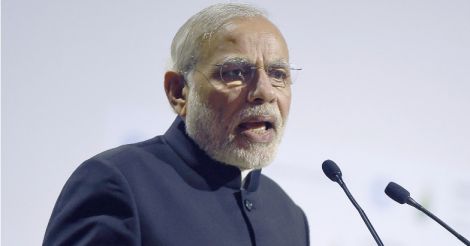AICC general secretary Digvijaya Singh is of the view that the BJP's crushing defeat in Bihar Assembly polls has succeeded in bringing about a change in the approach of Prime Minister Narendra Modi. Singh sees the invitation to the former prime minister Manmohan Singh and Congress president Sonia Gandhi for talks on the stalled constitutional amendment bill on GST as the proof of a practical, humbler Modi.
During the last six months, especially during the washed out monsoon session of Parliament, the opposition led by the Congress had accused the PM of being too rigid. He was not flexible enough in dealing with the opposition, they had charged. Modi was also accused of being in a 'election campaign mode' permanently by constantly slamming the Congress and its leadership for not co operating with him.
Of course, the opposition too was in a campaign mode as it constantly targeted the PM in Parliament for a host of reasons. The opposition's charge was that his silence on attacks against minorities had fostered a culture of intolerance in the country. The PM failed to protect those being attacked by the Sangh Parivar affiliates and also the BJP's ally Shiv Sena.
His ministers led by Finance Minister Arun Jaitley were on the offensive against the Congress, accusing that the main opposition party did not want Modi's development agenda to succeed. The electoral reverses in Bihar and the loss of the Ratlam Lok Sabha by-poll have been dampeners for the BJP.
There is a realisation within the BJP that the honeymoon period of the country's first single party majority government in the 21st century is over. There is also disillusionment over the non implementation of the mega promises made by Modi.
There is also an extraneous factor at play in seeking a consensus on the Goods and Services Tax and other priorities on the economic reforms agenda of the PM.
During his whirlwind foreign trips, he had been told by world leaders that he needs to to deliver on the reforms so that the climate for foreign direct investment would improve. This is because at the heart of Modi's 'Make In India' programme is the assumption that one trillion dollars worth of foreign investment will be routed towards the country in the next few years.
These investments were slated to come from major investing countries like US, Japan, China, United Kingdom, Australia and Singapore.
In 2014, soon after Modi became the Prime Minister he had extracted promises of more than $150 billion of investment from US President Barack Obama, Chinese President Xi Jinping, Japanese Prime Minister Shinzo Abe and the then Australian PM Tony Abboott, whose was succeeded by the present PM Malcolm Turnbull.
The 'reality check' happened when Modi was in the Turkish resort town of Antalya for meeting of the leaders of 20 large economies of the world.
He was lobbied hard on two issues by the leaders of the US, Japan, France and other countries.
Firstly, they all wanted India to join the other countries in agreeing to massive anti pollution targets at the climate change summit in Paris, as over the last two decades India had pursued its own independent agenda on climate change targets.
India under both A.B. Vajpayee and Manmohan Singh had caused a deadlock in negotiations as it wanted the developed countries to agree for higher emission cut targets and also to pay developing countries like India for adopting very expensive clean technology.
The major countries, especially the US, wanted both India and China to commit high levels of emission cuts in the next two to three decades.
But Modi has a different strategy on climate change targets. He is a strong proponent of solar energy and feels that massive investments in harnessing the sun will achieve the twin targets of generating lots of clean energy and achieve the huge developmental targets of the nation. Hence, he is for a consensus on the issue, unlike his two predecessors.
Modi wants the US to make massive investments in solar energy projects. The second issue on which world leaders have been prodding Modi is ushering in of more economic reforms so as to make it easier for multinational companies to make long term investments in India.
They have identified reforms in Goods and Services Tax, land acquisition laws and opening up of more sectors for foreign investments.
This is the reason why before Modi left for the G20 summit, foreign direct investment norms in 15 sectors was relaxed. On his return from Antalya, he reached out to the Congress on the Goods and Services Tax, by agreeing to be flexible on the four changes demanded by the Congress.
While he is doing all he can to improve the external environment for more investments, Modi needs to do more on the internal problems haunting his government. These include bringing down the soaring prices of food articles, a positive action plan against the climate of intolerance, solving the festering issue of one rank one pension, and generating a mood of positivism which will boost demand in the economy and generate jobs. The PM's plate is full on both external and internal agendas.
Tailpiece: The return of Amarinder Singh as the PCC president in Punjab may see him giving up the post of the deputy leader of the Congress in the Lok Sabha. Among the probable replacements being discussed in party circles are former parliamentary affairs minister Kamal Nath, the young brigade's Jyotiraditya Scindia and senior parliamentarian Mullappally Ramachandran.


























Disclaimer
The comments posted here/below/in the given space are not on behalf of Manorama. The person posting the comment will be in sole ownership of its responsibility. According to the central government's IT rules, obscene or offensive statement made against a person, religion, community or nation is a punishable offense, and legal action would be taken against people who indulge in such activities.